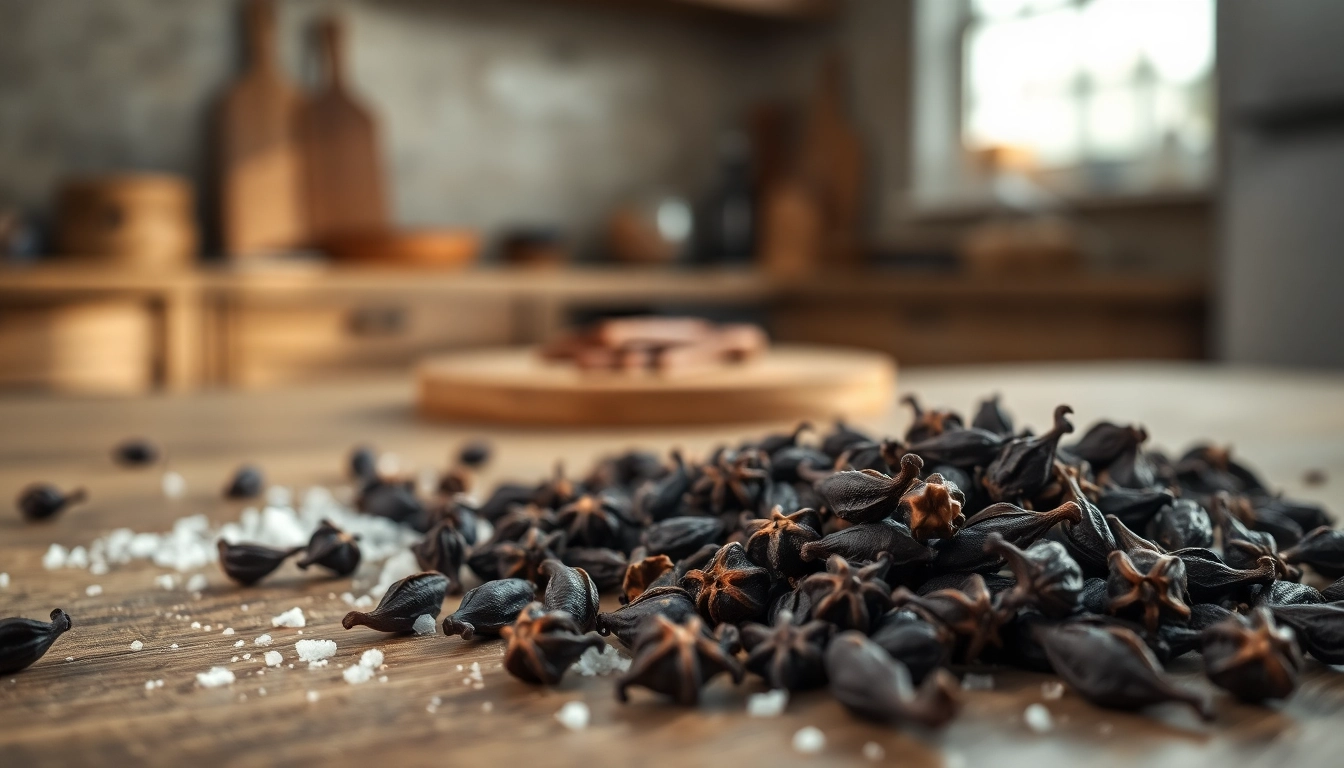
Understanding Cloves: An Overview
What Exactly Are Cloves?
Cloves are the aromatic flower buds derived from the clove tree, scientifically known as Syzygium aromaticum. These dried flower buds are small, typically measuring around 1–2 cm in length, and are known for their distinctive warm, sweet, and slightly bitter flavor. They belong to the family Myrtaceae and are used extensively in cooking, baking, and even in traditional medicine. An extraordinary feature of cloves is their high essential oil content, particularly eugenol, which gives them their characteristic aroma and flavor. To understand their significance and applications, you can explore more about cloves.
Botanical Family and Origins of Cloves
Cloves trace their origins back to the Maluku Islands, also known as the Spice Islands in Indonesia. The cloves are harvested from a tropical evergreen tree that can grow up to 8–12 meters tall. The tree produces small, aromatic flower buds that are gathered before they bloom. These buds, once dried, turn into the spice known as cloves. The production and trade of cloves were historically significant and played a vital role in the spice trade, making them one of the most sought-after spices during the Middle Ages.
How Cloves are Harvested and Processed
The harvesting of cloves is a meticulous process that involves hand-picking the flower buds before they blossom. The timing of the harvest is crucial; they are typically harvested when they are just starting to turn pink. After collection, the buds are dried in the sun, where they develop their dark brown color and pungent aroma. This drying process can take several days and is crucial for preserving their essential oils and flavor. Properly dried cloves retain their flavor for several months to a few years, depending on storage conditions.
Culinary Uses of Cloves
Incorporating Cloves in Cooking
Cloves are a versatile spice that can enhance a variety of dishes. They are commonly used in spice blends, such as garam masala, and play a prominent role in both savory and sweet recipes. Their strong flavor profile means that they should be used sparingly; a little can go a long way. Ground cloves are often used in baking, particularly in gingerbread, spiced cookies, and cakes, while whole cloves can be added to braised meats, stews, rice dishes, and even in marinades.
Cloves in Traditional and Modern Recipes
Traditionally, cloves have been used in dishes such as Indian biryani, Irish spiced beef, and the holiday favorite, mulled wine. In contemporary cuisine, they are often paired with carrots, sweet potatoes, and apples to bring warmth to the dish. Modern recipes often experiment with cloves in unexpected ways, such as in chocolate-based desserts or alongside citrus fruits, where their sweet-spicy notes elevate the overall flavor profile.
Flavor Profiles of Cloves and Pairings
The flavor of cloves is often described as warm, sweet, and slightly peppery with a hint of bitterness. When it comes to pairing, cloves complement other spices such as cinnamon, nutmeg, and ginger. They also work well with ingredients like apples, pears, and citrus fruits. In savory dishes, cloves can balance rich meats and stews, making them an integral part of warming winter dishes.
Health Benefits of Cloves
Nutrition Profile of Cloves
Cloves are not just a flavorful addition to meals; they also pack a nutritional punch. They provide vital nutrients like manganese, vitamin K, and dietary fiber. Just one teaspoon (about 2 grams) of ground cloves contains approximately 6 calories, and they are a rich source of antioxidants, which play a crucial role in fighting inflammation and oxidative stress.
Antioxidant Properties of Cloves
One of the standout benefits of cloves is their high levels of antioxidants, especially eugenol, which has been shown to combat free radicals in the body. These antioxidants contribute to overall health by reducing oxidative stress and preventing chronic diseases such as diabetes, heart disease, and certain cancers. Regular incorporation of cloves into your diet can contribute to improved health outcomes due to these protective properties.
Cloves for Digestive Health
Cloves are renowned for their beneficial effects on digestive health. Traditionally, they have been used to relieve digestive issues, including gas, bloating, and indigestion. The compounds in cloves can stimulate the production of digestive enzymes, enhancing nutrient absorption. Additionally, the anti-inflammatory properties of cloves can aid in soothing the digestive tract and supporting healthy liver function.
Understanding Clove Oil and Its Applications
Benefits of Clove Essential Oil
Clove essential oil is extracted from the flower buds and leaves of the clove plant. This oil contains high concentrations of eugenol, making it an effective anti-inflammatory and pain reliever. It’s commonly used in dental applications, especially for alleviating toothaches and as a mouthwash to combat bad breath. Beyond dental health, clove oil is praised for its antimicrobial properties, often used in natural remedies for infections.
Uses of Clove Oil in Home Remedies
Clove oil has a wide array of uses in home remedies. Its antiseptic qualities render it beneficial for treating minor cuts and scrapes while also being effective against respiratory ailments when mixed with a carrier oil in topical applications. Additionally, clove oil can be used in aromatherapy to relieve stress and promote relaxation due to its calming aroma. Furthermore, it can act as a natural insect repellent, making it a multi-purpose addition to any household.
Precautions and Side Effects of Clove Oil
While clove oil has many benefits, it is essential to use it safely. Due to its potent nature, clove oil should be diluted before applying topically, and it should never be ingested in large amounts. High doses can lead to gastrointestinal disturbances, allergic reactions, and damage to mucous membranes. Individuals with liver disease or those taking blood-thinning medications should consult their healthcare provider before using clove oil.
Where to Buy High-Quality Cloves
Top Brands Offering Whole Cloves
When looking for high-quality cloves, it’s essential to research and choose reputable brands. Some of the leading brands in the spice industry offer organic and sustainably sourced options. Noteworthy brands include McCormick, Simply Organic, and Spice Islands, which are known for their rigorous quality control and enhanced flavor profiles.
Buying Cloves Online: What to Look For
When purchasing cloves online, consider factors such as the product’s origin, reviews, packaging, and expiration date. Ensure that the cloves are sold in airtight packaging to retain their freshness and flavor. Seek sellers who provide detailed descriptions and sourcing information to ensure you’re getting a quality product.
Storing Cloves for Maximum Freshness
To maximize the shelf life of cloves, store them in a cool, dark place in an airtight container. Whole cloves retain their flavor for longer than ground cloves, typically lasting up to three to four years, while ground cloves are best used within one to two years. Proper storage helps maintain their potency and aromatic properties, ensuring you get the best out of your culinary endeavors.







